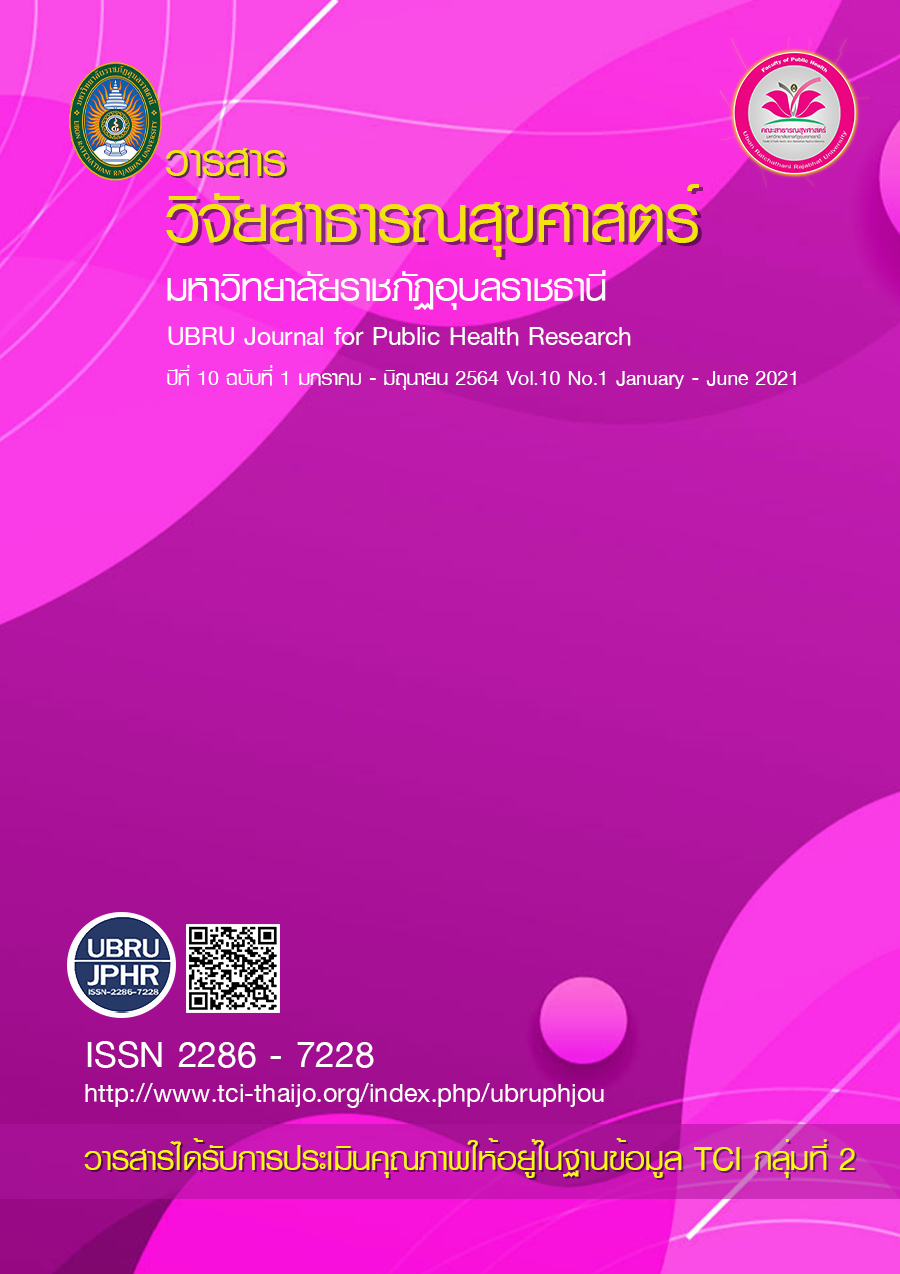An assessment of social return on investment for model of health tourism for elderly under the Philosophy of Sufficiency Economy
Keywords:
Health tourism, Social Return on InvestmentAbstract
This study aims to analyze costs and social return on investment (SROI) of the health tourism project for the Elderly under the philosophy of sufficiency economy (The health tourism project). It is a mixed method of exploratory sequential research design divided into 2 parts. The first part is qualitative research using content analysis to finding out what is the costs and social value outcome from the stakeholders. Then in the second part, the researchers take information from the first part to create a research tool to quantitatively collect the data from 30 informants who meet the inclusion criteria. Qualitative data were collected by in-depth interviews, and quantitative data by using questionnaires from January 2018 to January 2020. The data has been analyzed to calculate the SROI ratio and interpret the amount of social value created per 1 Thai Baht (THB) of investment.
The results showed that the key social value outcomes from the health tourism project is the participants change their health behavior. They can reduce the probability of complication of their diseases as diabetes mellitus and hypertension. So, it can save health expenditure in the public sector and household. The SROI ratio is 4.21: 1 THB. It means that 1 THB on investment can generate a social value of 4.21 THB in return.
Hence, the health tourism project is worth the benefit of the investment.
References
กิตติยา ชูโชติ, และ นิลวรรณ อยู่ภักดี. (2561). ค่าใช้จ่ายในการดูแลผู้ป่วยเบาหวานตามหลักการจัดกลุ่มโรคผู้ป่วยนอกเพื่อการจ่ายเงินที่โรงพยาบาล บางบัวทอง. วารสารวิจัยระบบสาธารณสุข, 12(4), 645–656.
เดือนเพ็ญ พึ่งพระเกียรติ, และสุพัฒศิริ ทศพรพิทักษ์กุล. (2558). ประสิทธิผลของโปรแกรมการดูแลผู้ป่วยภาวะกล้ามเนื้อหัวใจตายเฉียบพลัน ชนิดเอสทียก ในแผนกอุบัติเหตุและฉุกเฉิน โรงพยาบาลราชวิถี. วารสารกองการพยาบาล, 42(2), 6–22.
ทองทิพย์ สละวงษ์ลักษณ์, พุฒิพงษ์ สัตยวงศ์ทิพย์,ศิริพร พึ่งเพชร และ ทิวากรณ์ ราชูธร. (2562). การพัฒนาหลักสูตรส่งเสริมคุณภาพชีวิตผู้สูงอายุแบบมีส่วนร่วม เขตพื้นที่เทศบาลตำบลหัวทะเล อำเภอเมืองนครราชสีมา จังหวัดนครราชสีมา. วารสารวิจัยสาธารณสุขศาสตร์ มหาวิทยาลัย ราชภัฏอุบลราชธานี, 8(2), 133-140.
รวิพรรดิ พูลลาภ, อนัญญา เหล่ารินทอง และ สุพรรณ วนิชปริญญากุล. (2562). การส่งเสริมสุขภาพผู้สูงอายุในโรงเรียนผู้สูงอายุ กรณีศึกษา โรงเรียนผู้สูงอายุ วัดหัวฝาย ตำบลสันกลาง อำเภอพาน จังหวัดเชียงราย. วารสารวิจัยสาธารณสุขศาสตร์ มหาวิทยาลัยราชภัฏอุบลราชธานี, 8(1), 149 – 158.
“ระเบียบกระทรวงการคลัง ว่าด้วยค่าใช้จ่ายในการอบรม การจัดงานและการประชุมระหว่างประเทศ (ฉบับที่ 3) พ.ศ. 2555” ราชกิจจานุเบกษา เล่มที่ 129 ตอนพิเศษ 141 ง วันที่ 17 กันยายน 2555 หน้า 1 - 9
สุรสิทธิ์ ล้อจิตรอำนวย, ณัฏฐิญา ค้าผล, น้ำฝน ศรีบัณฑิต, และ ยศ ตีระวัฒนานนท์. (2560). การวิจัยเชิงสังเคราะห์เพื่อประเมินผลลัพธ์ทางเศรษฐศาสตร์ของนโยบายคลินิกหมอครอบครัว. นนทบุรี. Retrieved from https://kb.hsri.or.th/dspace/bitstream/handle/11228/4804/hs2375.pdf?sequence=3&isAllowed=y
สุวิมล ว่องวาณิช. (2552). การออกแบบและประเมินโครงการโดยใช้ทฤษฎีการเปลี่ยนแปลง. วารสารการวิจัยสังคมศาสตร์, 7–25.
อาทร ริ้วไพบูลย์. (2561). การวิเคราะห์ต้นทุนในการพัฒนาระบบสุขภาพ. กรุงเทพฯ: ศักดิ์โสภาการพิมพ์.
Anukoolsawat, P., Sritara, P., & Teerawattananon, Y. (2549). Costs of Lifetime Treatment of Acute Coronary Syndrome at Ramathibodi Hospital. วารสารโรคหัวใจ, 19(4), 132–143.
Banke-Thomas, A. O., Madaj, B., Charles, A., & van den Broek, N. (2015). Social Return on Investment (SROI) methodology to account for value for money of public health interventions: a systematic review. BMC Public Health, 15, 582. https://doi.org/10.1186/s12889-015-1935-7
Carter, N., Bryant-Lukosius, D., DiCenso, A., Blythe, J., & Neville, A. J. (2014). The Use of Triangulation in Qualitative Research. Oncology Nursing Forum, 41(5), 545–547. https://doi.org/10.1188/14.ONF.545-547
Jones, C., Edwards, R. T., & Windle, G. (2014). Social return on investment analysis of an art group for people with dementia. The Lancet, 384, S43. https://doi.org/10.1016/S0140-6736(14)62169-3
Lophongpanit, P., Tongsiri, S., & Thongprasert, N. (2019). Social Return On Investment For Patient Treated By Continuous Ambulatory Peritoneal Dialysis: A Case Study In Ubon Ratchathani Province, Thailand. ClinicoEconomics and Outcomes Research, 2019(11), 569–578.
Muyambi, K., Gurd, B., Martinez, L., Walker-Jeffreys, M., Vallury, K., Beach, P., & Dennis, S. (2017). Issues in Using Social Return on Investment as An Evaluation Tool. Evaluation Journal of Australasia, 17(3), 32–39. https://doi.org/10.1177/1035719X1701700305
NEJM Catalyst. (2017). What is value-based healthcare? Retrieved August 19, 2018, from https://catalyst.nejm.org/what-is-value-based-healthcare/
Nicholls, J., Lawlor, E., Neitzert, E., & Goodspeed, T. (2012). A guide to Social Return on Investment. The SROI Network. Accounting for Value, (January), 108. https://doi.org/10.4135/9781412973793.n132
Teerawattananon, Y. (2006). Cost Effectiveness and Cost Utility of Renal Replacement Therapy in Thailand. Journal of The Nephrology Society of Thailand, 12(2), 50–67.
The SROI Network Accounting for Value. (2012). A guide to Social Return on Investment. Retrieved from http://www.socialvalueuk.org/resource/a-guide-to-social-return-on-investment-2012/
Downloads
Published
How to Cite
Issue
Section
License
เนื้อหาและข้อมูลในบทความที่ลงตีพิมพ์ในวารสารวารสารวิจัยสาธารณสุขศาสตร์ มหาวิทยาลัยราชภัฏอุบลราชธานี ถือเป็นข้อคิดเห็นและความรับผิดชอบของผู้เขียนบทความโดยตรงซึ่งกองบรรณาธิการวารสาร ไม่จำเป็นต้องเห็นด้วย หรือร่วมรับผิดชอบใดๆ
บทความ ข้อมูล เนื้อหา รูปภาพ ฯลฯ ที่ได้รับการตีพิมพ์ในวารสารนี้ ถือเป็นลิขสิทธิ์ของวารสารฯ หากบุคคลหรือหน่วยงานใดต้องการนำทั้งหมดหรือส่วนหนึ่งส่วนใดไปเผยแพร่ต่อหรือเพื่อกระทำการใดๆ จะต้องได้รับอนุญาตเป็นลายลักอักษรณ์จากบรรณาธิการวารสารนี้ก่อนเท่านั้น


